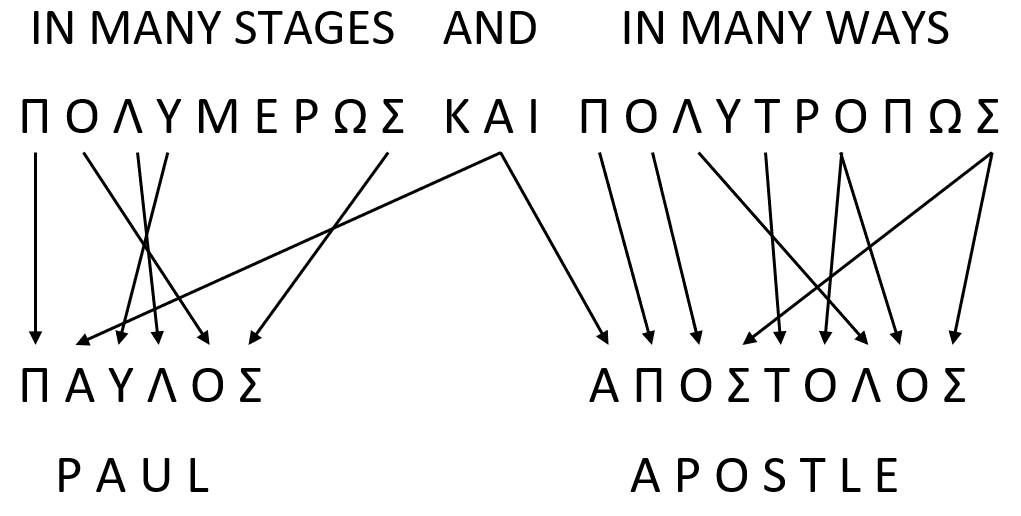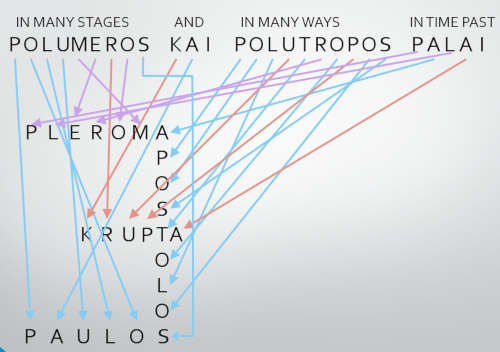
Whilst we accept that the subject matter of the Epistle to the Hebrews is more Hebraic in nature than the other epistles internally stated to be by Paul, we do not accept that that fact precludes Paul from writing an epistle to his own people. Indeed, Paul felt very strongly for his people (Romans 9:2 - 9:3). But he would need to be tactful, and write (apparently) anonymously, because of the negative reputation he had among the Jewish leaders, namely that Paul teaches “defection from Moses” (Acts 21:21). If Paul had overtly given his name, these leaders would certainly have denounced the epistle and warned against reading it. Paul was lashed (and worse) by them in 2 Corinthians 11:24 - 26.
Modern biblical scholarship considers the authorship of this epistle unknown [Wikipedia]. We claim that there is sufficient evidence to prove that the author of the epistle to the Hebrews is the apostle Paul.
There are also some very suggestive indications.
We now examine these claims in detail. Quotations are from the FarAboveAll translation.
Paul's typical salutation is ΠΑΥΛΟΣ, ΑΠΟΣΤΟΛΟΣ (Paul, an apostle). The epistle to the Hebrews starts with ΠΟΛΥΜΕΡΩΣ ΚΑΙ ΠΟΛΥΤΡΟΠΩΣ (In many stages and in many ways). This may not look like a salutation, but ΠΟΛΥΜΕΡΩΣ ΚΑΙ contains the letters of ΠΑΥΛΟΣ and ΚΑΙ ΠΟΛΥΜΕΡΩΣ contains the letters of ΑΠΟΣΤΟΛΟΣ, though the letters ΑΟΣ require sharing.

We include here the word ΠΑΛΑΙ, PALAI, in time past, and we lay down the word ΠΛΗΡΩΜΑ, PLEROMA, fullness, one of Paul's favourite words. We area aware that this works well in English, but not exactly in Greek, because we transliterate the long and short Greek E (Η and Ε) both as English E, and the long and short Greek O (Ω Ο) both as O. KRUPTA (Greek ΚΡΥΠΤΑ) means cryptically.

N.B. This decoding does not work in the Syriac Peshitta. One does not obtain ܦ݁ܰܘܠܳܘܣ ܫܠܺܝܚܳܐ (Paulaus shelicha - Paul an apostle) from ܒ݁ܟ݂ܽܠ ܡܢܰܘܳܢ ܘܰܒ݂ܟ݂ܽܠ ܕ݁ܶܡܘܳܢ (bekul menawan wabkul demwan - in many parts and in many forms). We regard this as evidence that the New Testament was originally written in Greek, not Aramaic.
The apostle Paul tells us how he closes each epistle in 2 Thessalonians 3:17 - 18.
The greeting of Paul by my own hand, which is a sign in every epistle – I write like this. 18The grace of our Lord Jesus Christ be with you all. Amen.
Let us test this with each epistle of Paul's:
Romans 16:24
The grace of our Lord Jesus Christ be with all of you. Amen.
N.B. Romans 16:24 is the last verse in the majority of manuscripts. The AV's verses Romans 16:25 - 27 are at Romans 14:24 - 26 in the majority of manuscripts.
1 Corinthians 16:23 - 24
The grace of the Lord Jesus Christ be with you. 24May my love be with all of you in Christ Jesus. Amen.
2 Corinthians 13:14
The grace of the Lord Jesus Christ and the love of God and the fellowship of the holy spirit be with you all. Amen.
Galatians 6:18
The grace of our Lord Jesus Christ be with your spirit, brothers. Amen.
Ephesians 6:24
Grace be with all those who love our Lord Jesus Christ in sincerity. Amen.
Philippians 4:23
The grace of the Lord Jesus Christ be with you all. Amen.
Colossians 4:18
The greeting of Paul in my own handwriting. Remember my bonds. Grace be with you. Amen.
1 Thessalonians 5:28
The grace of our Lord Jesus Christ be with you. Amen.
2 Thessalonians 3:18
The grace of our Lord Jesus Christ be with you all. Amen.
1 Timothy 6:20 - 21
Timothy, guard the deposit, avoiding profane vain talk and contradictions of science falsely so called, 21which some profess and have deviated concerning the faith. Grace be with you. Amen.
2 Timothy 4:22
The Lord Jesus Christ be with your spirit. Grace be with you. Amen.
Titus 3:15
All those with me greet you. Greet those who love us in the faith. Grace be to you all. Amen.
Philemon 1:25
The grace of our Lord Jesus Christ be with your spirit. Amen.
And how does Hebrews conclude?
Hebrews 13:25
Grace be with you all. Amen.
Now let's see how the other epistles conclude.
James 5:19-20
Brothers, if anyone among you strays from the truth, and someone turns him back, 20let him know that he who turns a sinner back from the error of his way will save a soul from death and cover a multitude of sins.
1 Peter 5:14
Greet each other with a loving kiss. Peace to all of you who are in Christ Jesus. Amen.
2 Peter 3:18
But grow in grace and knowledge of our Lord and saviour Jesus Christ. To him be glory both now and throughout the age-abiding day. Amen.
1 John 5:21
Little children, keep yourselves from the idols. Amen.
2 John 1:13
The children of your elect sister greet you. Amen.
3 John 1:14
But I hope to see you very shortly so we can speak face to face.
Peace to you. The friends here greet you. Greet the friends there by name.
Jude 1:25
To the only and wise God our saviour
Be glory and majesty,
Might and authority,
Both now and throughout all the ages.
Amen.
We see that Paul concludes his epistles in the same way, as he stated he does, with minor variations, and that the Epistle to the Hebrews fits the category. The remaining epistles end in a different way, and only 2 Peter even mentions grace, using the word in an exhortation rather than a blessing.
Peter was an apostle to the circumcision, i.e. the Hebrews (Galatians 2:9). In his first epistle he describes his readers as the diaspora. He writes to the same people in his second epistle (2 Peter 3:1), expecting them to be aware of the first one, and at least making them aware of it. And then he tells them that Paul wrote to them.
2 Peter 3:15
And consider our Lord's longsuffering as salvation, as our beloved brother Paul also wrote to you according to the wisdom given to him,
So Paul wrote an epistle to the Hebrews.
The writer of Hebrews was not a witness to the Lord's earthly ministry. This can be seen from Hebrews 2:2 - 4.
Hebrews 2:2 - 4
For if the word spoken by angels came to be inviolable, and every transgression and disobedience received legitimate retribution, 3how shall we escape if we neglect so great a salvation, which started to be spoken about by the Lord and was confirmed to us by those who heard it, 4while God bore additional witness with them in signs and miracles and various deeds of power and by distributions of holy spirit, according to his will?
Paul is a minister of the risen Christ, and he only saw the risen Christ, on his way to Damascus (Acts 9:3 - 5). He would not have been eligible to replace Judas (Acts 1:21). And the writer of Hebrews is in the same position. We don't claim this as proof that Paul wrote Hebrews, but it corroborates the earlier evidence.
Paul was imprisoned in Rome (Acts 28:16). From there he wrote several epistles mentioning his bonds, including 2 Timothy (bonds in 2 Timothy 2:9 and Hebrews 10:34). We only read of Timothy in Acts, 1 Corinthians, 2 Corinthians, Ephesians, Philippians, Colossians, 1 Thessalonians, 2 Thessalonians, 1 Timothy, 2 Timothy, Philemon, and Hebrews.
Hebrews 13:23 - 24
Be informed that our brother Timothy has been released, with whom, if he comes quickly, I will see you. 24Greet all your leaders and all the saints. Those from Italy greet you.
Again, we don't claim this as proof that Paul wrote Hebrews, but it corroborates the earlier evidence.
Again, we don't claim this as proof that Paul wrote Hebrews, but it corroborates the earlier evidence.
We have supplied abundant evidence that the author of the Epistle to the Hebrews is the apostle Paul.